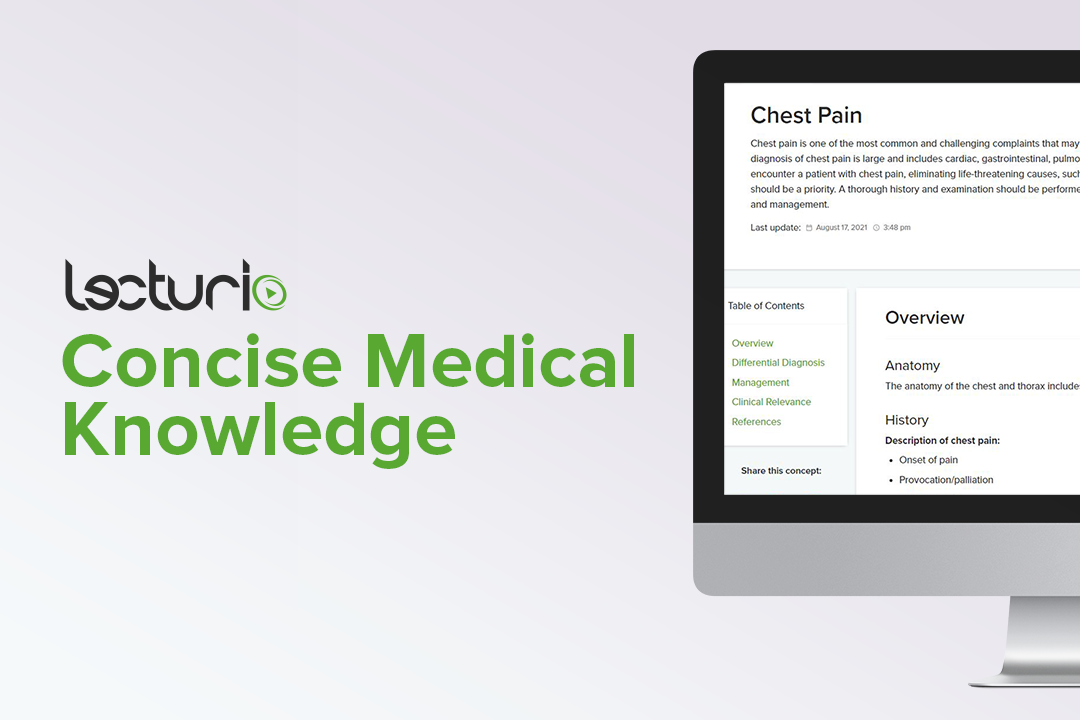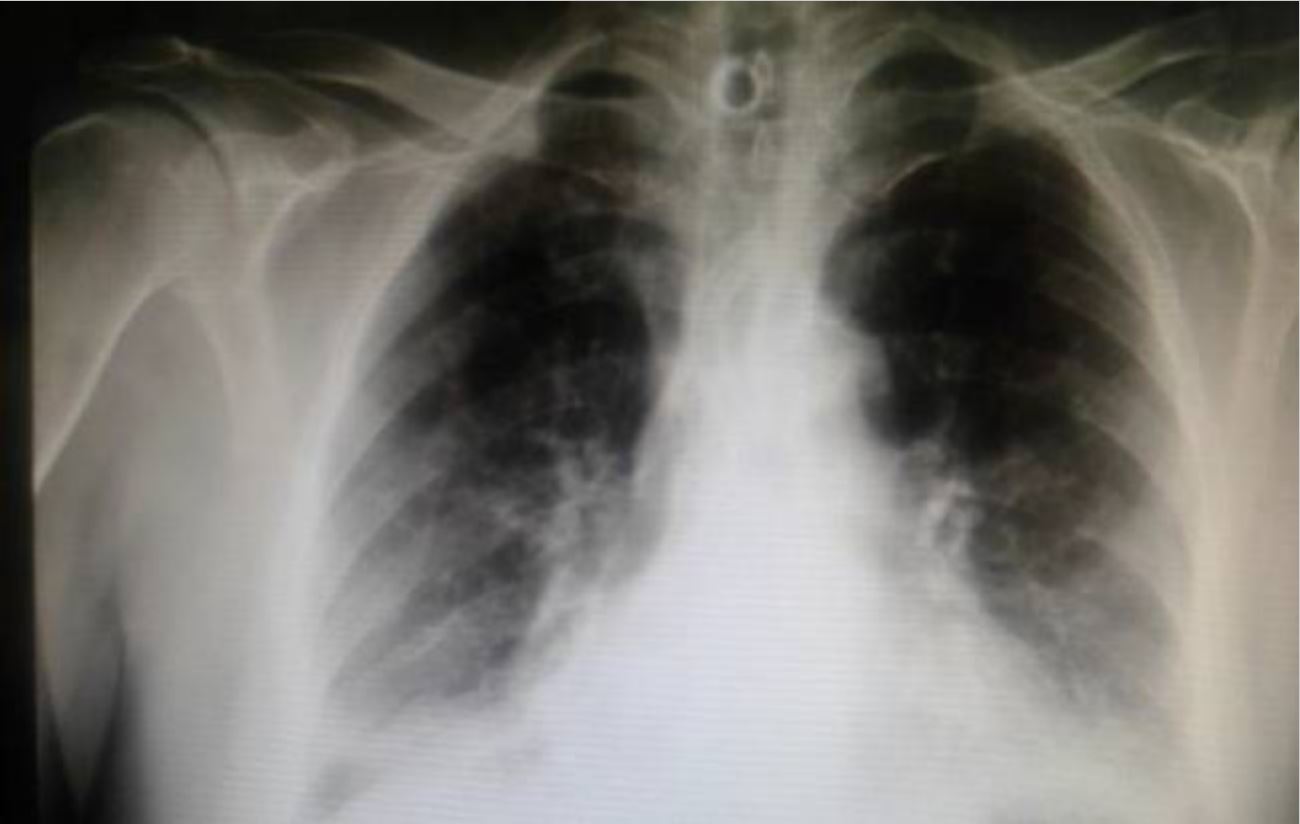Playlist
Show Playlist
Hide Playlist
Symptoms: Wheeze, Chest Pain and Cough – Lung Disease
-
Slides 04 EpidemiologicalFactors&History Basic.pdf
-
Download Lecture Overview
00:00 Wheeze is a noise when you're inspiring or expiring, when you're breathing in or out. 00:05 And what that indicates is that there's turbulent airflow in the trachea. Instead of having a nice, smooth tracheal bronchial tree with air flowing down it nicely, there's some tightness, and that causes turbulent flow, which means that the patient will hear a noise when they're breathing in and out. It's actually a very variable symptom. It tends to come and go. 00:27 It obviously will be worse when the disease is suffering exacerbation and people are feeling worse and may be better when they're… when that is controlled. 00:36 The main causes or causes of airway obstruction: So that's asthma, COPD, bronchiectasis, and also large airways obstruction. So for example, you have a stricture of the trachea; that will cause a wheeze, but that's usually on inspiration and not on expiration. And an inspirational wheeze is called stridor. And large airways obstruction wheezes can be positional, so when the patient lies back, it gets worse; when they sit forward, it feels easier for them. Chest pain is pretty common in patients with respiratory disease. But actually, only rarely is it due to a serious cause. So how can we differentiate patients who've got chest pain which is not a serious cause from those with a potentially… potential serious cause which requires further investigation? Well, there are certain warning signs, warning symptoms. So if a pain is occurring in one area around the chest wall, and it's constant (it's there the whole time) but increasing in intensity over time, that is a very worrying situation, because that's the sort of pain that would happen if you have a cancer that's affecting the chest wall. With… as the cancer gets worse, the pain progresses, and because it's always invading the chest wall, the pain is constant. Pleuritic chest pain is quite different. This reflects inflammation of the pleurae, and this is a sharp, localized pain that occurs in the area of inflammation. So for example, if you have a left-sided lower lobe pneumonia and overlying pleural inflammation, as you breathe in, you'll get a very sharp pain here overlying where the pleurisy is. And that stops you from taking a deep breath. The patient will describe, "I get a pain when I breathe in, and I really try not to breathe in," and they're breathing shallowly as a complication… as a consequence. This is an indication of pleural inflammation. That occurs mainly in infection or in pulmonary emboli, but it can occur in other situations where you get pleural inflammation. 02:40 Central exertional chest pain is not a respiratory problem; that would suggest ischemia of the heart and angina, and that requires cardiologic investigation. And somebody who presents with sudden onset of chest pain—one minute they're fine; the next second they've got quite marked chest pain—then you need to think about pneumothorax or PEs (pulmonary emboli). 03:01 Many patients with respiratory disease will have what we describe as musculoskeletal chest pain, and this is a little bit like pleuritic chest pain in that it's a localized pain that's often made worse by taking a deep breath or by coughing, but it's not as sharp. It doesn't stop them from breathing; it's just there when they breathe. It's not so localized as a pleuritic chest pain, and it often moves around the chest. And of course, it's made worse by twisting and turning as well, whereas pleurisy itself should not be. And this sort of pain is very common in anybody who's been coughing a lot because of the straining of cough… pulls onto the… as it pulls on the chest wall. And it's common in patients with pleural disease, pleural thickening, or due to bronchiectasis. Any other chronic lung disease, it's quite common for someone to have musculoskeletal chest pain. And the important thing here is that it moves around. It's worse on moving, twisting the body as well as inspiration. Then we can be fairly relaxed about the pain and that it's not likely to be pleurisy or another serious cause. Cough is probably one of the commonest of respiratory symptoms. There are many causes of cough. We all know that getting a respiratory tract infection—a viral infection of the throat or the trachea—will cause a cough. 04:22 And that only lasts for a few days, and that must be, by far, the commonest cause across the globe. But the important thing about that is that it's a cough that comes on with other symptoms suggestive of a respiratory tract infection, and it's not going to last. It only lasts for a few days—maybe two, three weeks if you're unlucky. 04:39 A persistent cough is a different situation. So there are such… there are particular things that we need to think about with somebody presenting with a new persistent cough. If they smoke cigarettes and they're over 50 years of age, a persistent cough which has… of a new onset, you really need to think that lung cancer might be present, because lung cancer is… the commonest symptom is a cough. And that patient will require a chest x-ray to be sure that there are no new masses. Somebody's got a persistent cough and other respiratory symptoms—mainly breathlessness is the commonest one—then that does suggest they could have a chronic lung disease such as COPD or interstitial lung disease. And it's quite likely they'll have [Inaudible 00:16:50] from examination, and x-ray will be abnormal as will their lung function tests. And that requires further investigation for whatever the underlying lung disease might be. If they have a persistent cough with sputum production, that does suggest that they either have been smoking, with a smoker's cough (chronic bronchitis); COPD, which is a smoker's plus airways obstruction; or bronchiectasis. And occasionally, patients with asthma also do have some sputum production as well. 05:51 So this slide lists some of the causes of cough, and it's quite an extensive list, as you can see. Acute cough is largely an infective problem: bronchitis, upper respiratory tract infection, pneumonia, or exacerbations of chronic lung disease such as COPD or asthma, which are usually infective in origin. In addition, you can inhale foreign bodies. The things that we often see are teeth which are knocked out during somebody's general anesthetic can end up in the lung, or people can swallow… can be eating food and chicken bones, etc., can end up being inhaled by mistake, and that will cause a sudden onset of cough, which is fairly obvious as to why the patient is presenting with cough. 06:33 Chronic cough, persistent over several weeks: Then the main issues are whether they have asthma, COPD, whether it's just due to smoking cigarettes, or whether the patient may have lung cancer. There's another condition, postinfective bronchial hyper-reactivity, which is persistent cough that occurs after a viral tract infection, which I'll describe in the lectures on airways disease. But there are myriad level causes of chronic cough, gastroesophageal reflux being quite a common one, where the acid coming up from the stomach into the esophagus stimulates a cough reflex in the patient. Chronic upper respiratory tract disease such as sinusitis and rhinitis: The inflammation forms the droplets which form down the back of the throat and get inhaled into the lung. That's called a postnasal drip. And that will cause a chronic cough as well. But there are several other causes which need to be considered. 07:28 So if you've got somebody presenting with cough but has no evidence for other lung disease—their lung function's normal; the x-ray's normal; the examination doesn't really identify any abnormalities (when you listen to the chest, for example)—then what sort of things do you need to think about? Well, there are three main causes of cough in this situation. One is asthma. The other is gastroesophageal reflux. And the other is a postnasal drip. 07:53 If somebody has asthma, the cough tends to have a diurnal variation: It's worse in the morning, and in fact, during bad periods, it will wake the patient in the middle of the night. It's also worse by various stimuli: cold air, viral infections, inhaling dust and smoke: These all would suggest the patient may have asthma if they make the cough worse. 08:15 And with asthma, because it's a variable disease, you have periods where the cough is either better or gone completely, and then it returns—perhaps after a respiratory tract infection, for example. 08:27 Gastroesophageal reflux: That's a problem that is made worse by eating lots of food and spicy foods and lying down immediately afterwards. And postnasal drip: The patient will describe symptoms of upper respiratory tract disease. They'll have a rhinitis with a snotty nose, maybe a runny nose. They might even feel the postnasal drip of the inflammatory material dripping down the back of their throat. If somebody has a cough productive of daily purulent phlegm, that might suggest they have bronchiectasis, and that would require further investigation.
About the Lecture
The lecture Symptoms: Wheeze, Chest Pain and Cough – Lung Disease by Jeremy Brown, PhD, MRCP(UK), MBBS is from the course Introduction to the Respiratory System.
Included Quiz Questions
An otherwise healthy 25-year-old presents with sudden onset of severe dyspnea. Which of the following conditions would be the most likely diagnosis?
- Pneumothorax
- COPD
- Pulmonary fibrosis
- Anemia
Which of the following is an UNLIKELY clinical association?
- Hemoptysis and asthma
- Hemoptysis and lung cancer
- Wheeze and gastroesophageal reflux
- Pleural effusion and bronchiectasis
Wheezing would indicate what type of abnormality in the trachea?
- Reduced diameter
- Rupture
- Infection
- Exudate
- Expansion
What is stridor?
- An inspiratory wheeze
- An infection of the chest wall
- An alternating slow/fast respiration
- A complication of tracheotomy
- A complication of cricothryodotomy
Which of the following is characteristic of pleuritic chest pain?
- Sharp pain
- Dull pain
- Gnawing pain
- Progressive pain
- Nocturnal pain
Customer reviews
5,0 of 5 stars
| 5 Stars |
|
2 |
| 4 Stars |
|
0 |
| 3 Stars |
|
0 |
| 2 Stars |
|
0 |
| 1 Star |
|
0 |
Amazing explanation , nice voice , straight to the point, I like it very much
The use of visuals, sectioned topics and thorough teaching of each sections are all superb.





